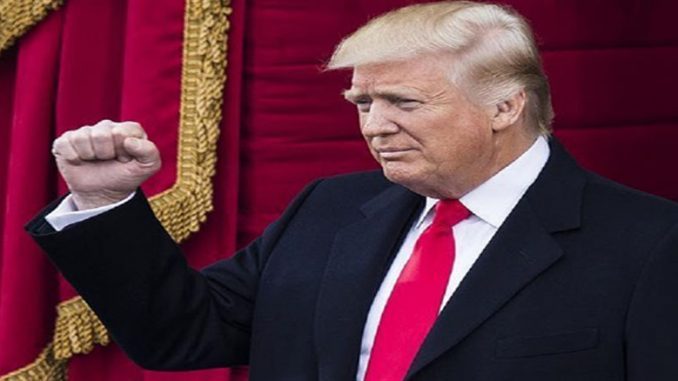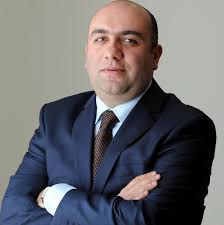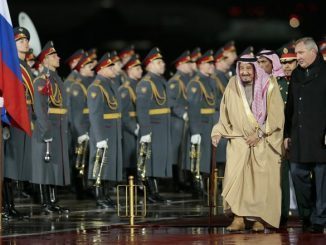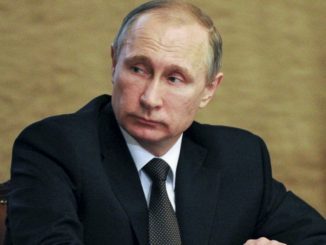
 BY: ÇETİNER ÇETİN*
BY: ÇETİNER ÇETİN*
With the change of the U.S. administration, geopolitical situation in the Middle East has also started to change considerably. In addition to his quest for cooperation with Russia, President Donald Trump’s intimacy with Israel is striking. On the other hand, he has a strong sense of insecurity against Iran and is revising relations with Saudi Arabia. Last week, Trump announced that he canceled the plan to fight against Daesh, which was set by his predecessor, Barack Obama. Then 48 hours after holding a telephone conversation with Turkish President Recep Tayyip Erdoğan, new Central Intelligence Agency (CIA) Director Mike Pompeo paid his first official visit to Ankara – revealing the U.S.’s desire to work with Ankara in the new period.
While Russia, which has become the regional giant due to Obama’s incompetence, has been trying to expand its influence, the composition of the international forces in the Syrian civil war has changed considerably over the past two months. Trump, a figure from outside the political world, is greatly influenced by his cronies in his policies. As his senior adviser, Trump’s Jewish son-in-law and right-hand man, Jared Kushner, is said to be responsible for his policies on trade and the Middle East. With Kushner’s suggestion, Trump named attorney, David Friedman, an old friend of him, as the U.S. Ambassador to Israel. Friedman is close to Israel’s right-wing forces. So, Israeli Prime Minister Netanyahu, whose relations declined during the Obama era, thinks that he has found a good opportunity in the U.S. administration change.
New Jewish settlement plans in the Palestinian autonomous region are being ratified one after the other. If the U.S. Embassy is taken to Jerusalem from Tel Aviv as Trump emphasized in his election campaign, regulations for immigrants coming from Muslim countries will increase – which will lead to a sudden explosion of Arab countries’ antipathy for the U.S. As this will benefit radical forces, the U.S. must make a careful evaluation.
U.S. Vice President Mike Pence, who met King Abdullah of Jordan on Jan. 30, just said “It is yet in the cautious evaluation stage.”
The White House issued a statement on Feb. 2, saying that expansion of the settlements would not be beneficial, making a slight correction to its close stance on Israel.
It seems the next focal point will be the intensification of the clash with Iran. It is hard to unilaterally nullify the deal on Iran’s nuclear activities as it is a multilateral deal which was signed by five permanent members of the UN Security Council and Germany.
Speaking at an upper chamber session, James Mattis, Secretary of Defense, said he respects the deal and it must be applied despite its shortcomings. However, the Republican Party, which constitutes majority in total of both chambers, has deep-rooted distrust in Iran. The Trump administration has imposed new sanctions against Iran, warning it of ballistic missile tests.
The change in the U.S.’s attitude affects domestic politics in Iran, which is scheduled to hold presidential elections in May. It is predicted that Iranian President Hassan Rouhani, who does not have a strong rival, will be re-elected. However, pro-hardline conservatives also seem to watch for an opportunity to catch up with him.
Depending on the U.S.’s attitude, the possibility of Iran turning its back on the enforcement of the deal must also be taken into account. How will the future relationship be shaped in a period after the
Obama administration made some concessions to Iran and developed a feeling of insecurity in Saudi Arabia?
This is one of the most frequently asked questions. Saudi Foreign Minister Adel al-Jubeir pointed to their expectations of the Trump administration about the enlargement of cooperation, saying, “We agree about the overthrow of extremists and clamping down on Iran.” However, this does not mean there is not a serious ground for friction between the two countries.
One example of this friction is the law on the imposition of terrorism supporters, which went into force in the U.S. last year as a result of the pressure by the families of those who died in the simultaneous terror attacks in 2001. Most of the perpetrators in these attacks were Saudi. The law will create a big wave as it will pave the way for bringing a suit against the governments of foreign countries like Saudi Arabia that have not been a target of such suits so far.
The conditions surrounding the Syrian civil war, where Saudi Arabia supports rebels, are also rapidly changing. Last December, the Assad administration, which is supported by Russian troops, seized the northern city of Aleppo. On Dec. 20, one day after the Russian ambassador to Turkey was shot dead, Russia, Turkish and Iranian foreign and defense ministers held a meeting and issued a joint press statement, saying that they would be the guarantor of a future agreement to be reached by the Syrian government and rebels. Accordingly, on Dec. 29, Russia and Turkey announced a ceasefire agreement for Syria that was approved by the UN.
The biggest change was that Turkey, which supports Syrian opposition forces, acted as mediator between power balances in the Middle East. Turkish Deputy Prime Minister Mehmet Şimşek said, “The situation has changed dramatically. It would not be realistic to solve the problem by excluding Assad.”
What changed the situation was Russia’s military intervention in Syria that started in September 2015. In an attempt to reinforce its political influence, Russia created conditions that would not have been possible except for rebels being part of negotiations.
Arab countries did not join the Astana talks, during which Russia, Turkey and Syria decided to form the frame of watching the ceasefire. This symbolizes the joint achievement of a diplomatic initiative by Russia, Turkey and Iran.
While continuing to attack the Shiite groups in Yemen, which are supported by Iran, Saudi Arabia is also trying to establish a military base in Djibouti on the other side of Yemen. It is a big change that Saudi Arabia is establishing a military base in a foreign country for the first time.
The Trump administration is rushing to destroy the radical organization, Daesh. While the idea of deploying many U.S. troops has not been actualized, plans are underway to cooperate with Russia to mop up Daesh. The Obama administration had also thought to cooperate with Russia to strike Daesh. However, the Pentagon strongly reacted to sharing information with Russian troops. The situation and the course of the Middle East in the Trump-Putin era primarily depends on to what extent the U.S. and Russia can work together.
Another development is that new CIA director Pompeo paid a fast-track visit to Ankara and met Erdoğan to set the ways of how to deal with two biggest regional issues – the fight against Daesh and the termination of the Syrian civil war – less than 48 hours after Trump and Erdoğan held a telephone conversation. However, Ankara is cautious due to the distrust that emerged in the Obama period. Reportedly, Ankara told Pompeo that Daesh is included in all plans and the PKK cannot be excluded from the process. Ankara views Pompeo’s visit as a stepping stone for Trump to restore the relations
that have been damaged due to the groups with which the Obama administration acted in unison in the fight against Daesh over the past three years. Despite everything, Ankara is still cautious. Pompeo’s visit is seen as a sign that the U.S. will give more support to the efforts of defeating Daesh with the help of the groups supported by Turkey in the region.
Diplomatic sources said that the negotiations are aimed at coordinating the ground interventions in Daesh-held areas other than al-Bab. However, plans for mobility at the scene and operation are still on the table. Working groups from Turkey and the U.S. will work on planning.
Let us briefly touch on Trump’s Islamophobic rhetoric. Although the results of the step he will take in the Middle East are not known, his policies seem more predictable than Obama’s s for all Muslim countries.
*Çetiner Çetin is a Turkish journalist. He wrote this article exclusively for the Middle East Observer on Wednesday, Feb. 11, 2017.



